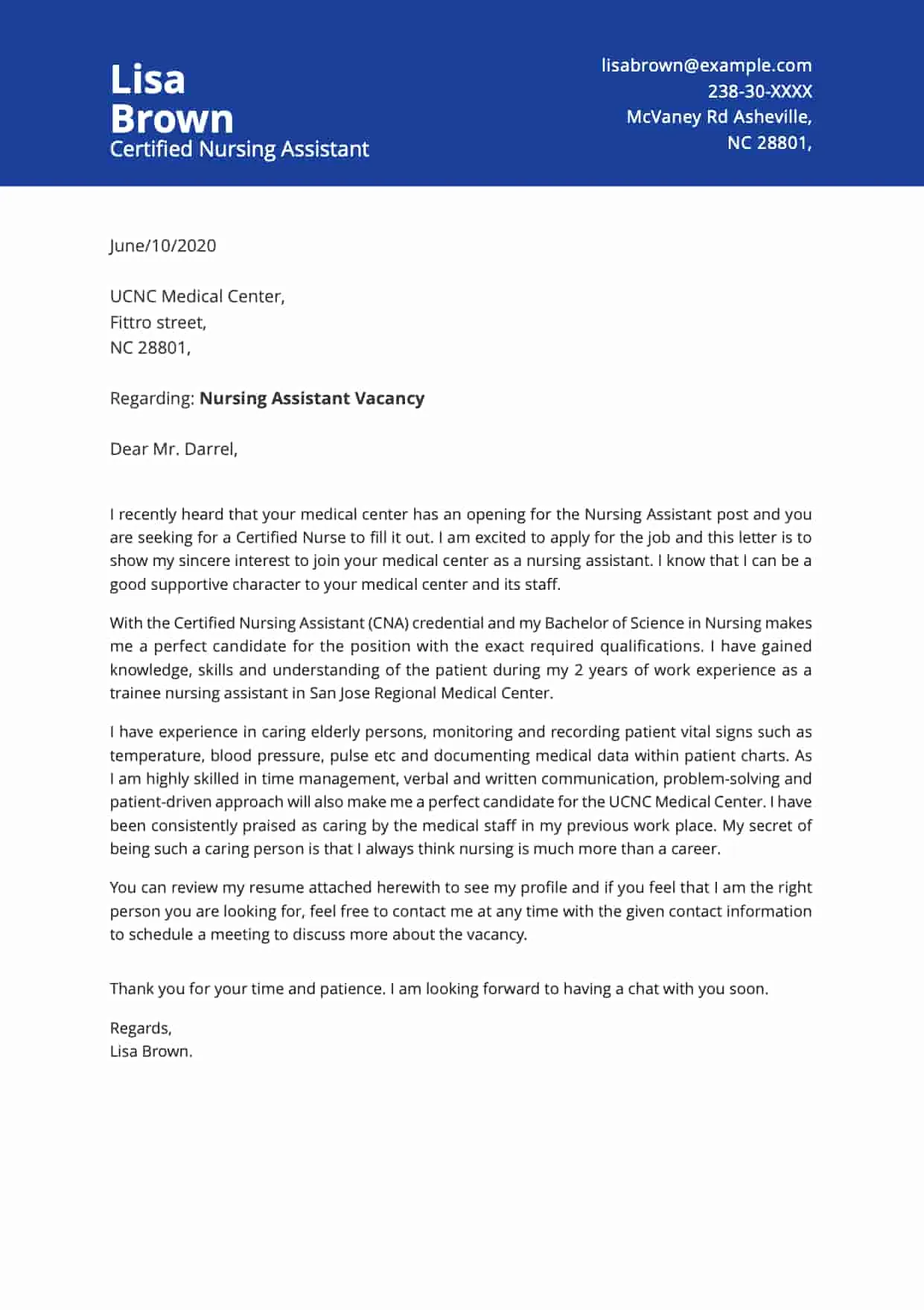Understanding the Importance of a Nursing Assistant Cover Letter
A well-crafted assistant in nursing cover letter is your first impression to potential employers. It serves as a crucial introduction, offering a glimpse into your qualifications, skills, and personality. It’s not just a formality it’s an opportunity to showcase why you’re the perfect fit for the position and the healthcare facility. The cover letter allows you to elaborate on experiences and qualifications that might not fully shine through your resume, giving you a chance to connect with the hiring manager on a more personal level. By demonstrating your understanding of the role and your enthusiasm for patient care, you set yourself apart from other applicants. This document is your chance to shine and make a positive impact.
Key Components of a Successful Cover Letter
A successful cover letter for an assistant in nursing position has several key components that work together to create a compelling narrative. Begin with your contact information, making it easy for the employer to reach you. The greeting should be professional and addressed to a specific person whenever possible. The body of your letter should highlight relevant skills and experience, emphasizing any certifications or training you possess. Include quantifiable achievements to demonstrate your impact in previous roles. Express your passion for patient care and showcase your soft skills, such as adaptability and teamwork. End with a strong closing, thanking the reader and including a clear call to action.
Contact Information

At the top of your cover letter, include your full name, address, phone number, and email address. Ensure the information is accurate and professional. Double-check for any typos or errors. This section is essential as it enables the potential employer to contact you easily. Make sure your email address sounds professional, avoiding nicknames or casual language.
Greeting and Opening
Address the hiring manager by name if you know it. If not, use a professional greeting such as “Dear Hiring Manager.” The opening paragraph should immediately grab the reader’s attention by stating the position you are applying for and where you saw the advertisement. Briefly mention your relevant experience and what makes you a strong candidate. Show enthusiasm for the role and the facility.
Highlighting Relevant Skills and Experience
Use the body of your cover letter to detail your relevant skills and experience. Focus on how your abilities align with the job requirements. Mention any specific tasks or responsibilities you handled in previous roles. Tailor your skills section to the specific job description, highlighting the skills that are most relevant to the position. Consider including skills such as patient care, vital sign monitoring, and assisting with daily living activities. Provide specific examples to support your claims, such as assisting a certain number of patients or managing a particular situation.
Certifications and Training
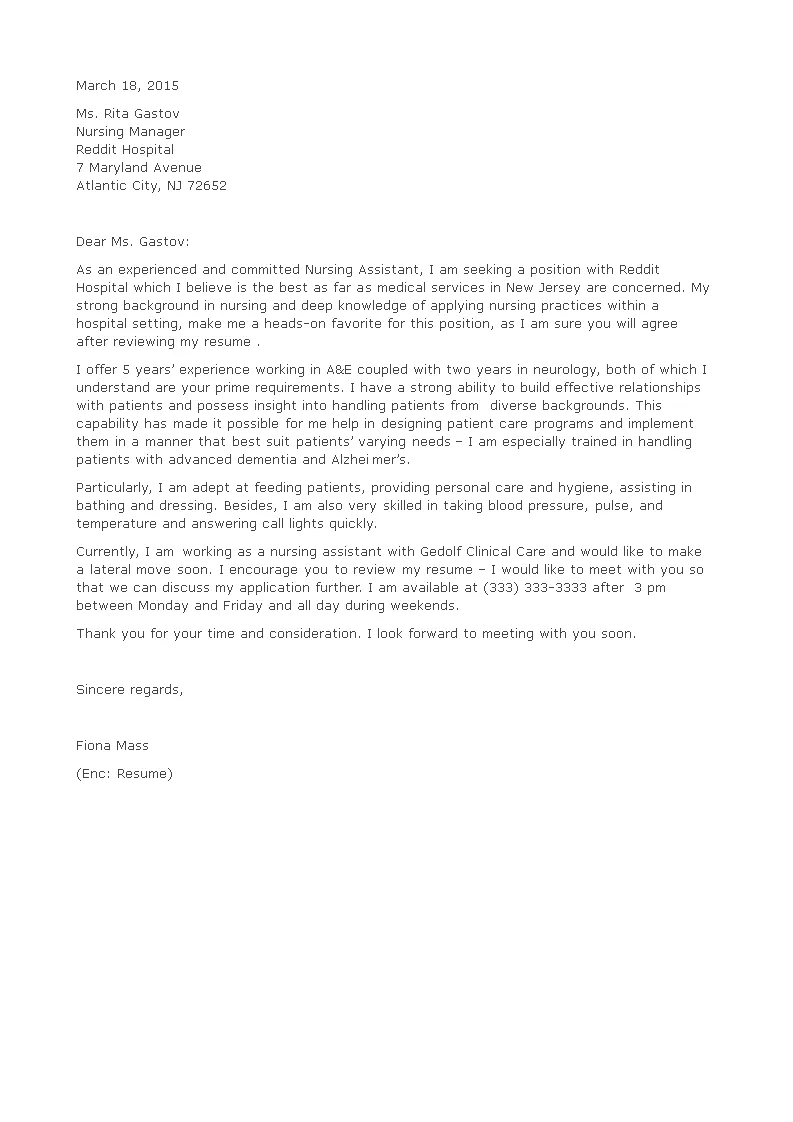
If you have any certifications or completed training, such as Certified Nursing Assistant (CNA) certification or Basic Life Support (BLS), be sure to mention them clearly in your cover letter. Note the name of the certification, the issuing organization, and the date of completion. This information is crucial as it demonstrates your qualifications and readiness for the role. Providing proof of certifications boosts your application and increases your chances of moving forward in the selection process.
Quantifiable Achievements
Whenever possible, provide quantifiable achievements to demonstrate the impact you made in previous roles. Instead of saying “provided excellent patient care,” say “assisted an average of 10 patients daily, consistently receiving positive feedback.” Quantifiable metrics make your achievements more tangible and easier for the employer to understand your contributions. Did you improve patient satisfaction scores, reduce incidents, or contribute to a smoother workflow? Include these details to showcase your performance.
Demonstrating Passion for Patient Care
Expressing genuine passion for patient care is a vital part of your cover letter. Share your motivation for wanting to work in healthcare and the aspects of the job that most appeal to you. Show that you understand the importance of providing compassionate and empathetic care. Mention specific experiences where you went above and beyond for patients. This passion should shine through in your words and reveal your dedication to the well-being of others. Passion for patient care is one of the most important attributes you can show.
Showcasing Soft Skills
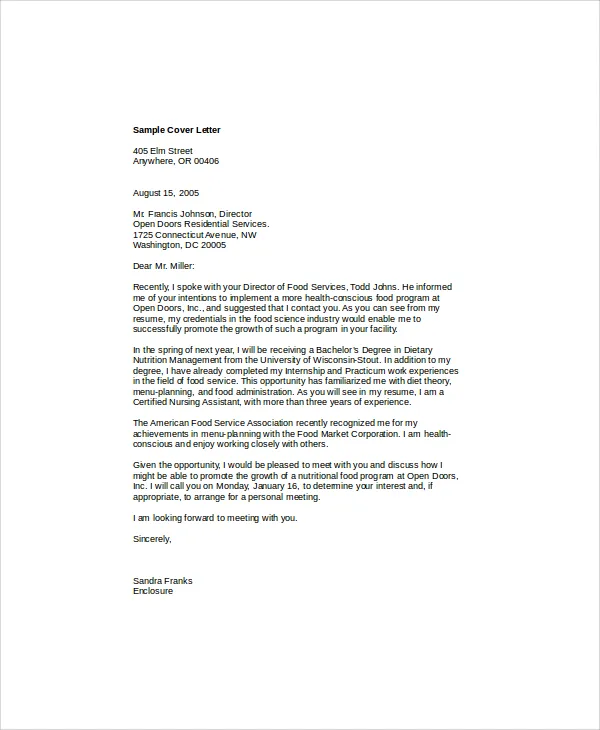
Nursing assistant roles require a range of soft skills, such as communication, empathy, and problem-solving. Highlight these skills in your cover letter by giving examples of how you’ve used them in the past. For instance, describe a time you effectively communicated with a patient or a difficult family member. Show how you demonstrated empathy during a challenging situation. Explain how you solved a problem that improved patient care. Demonstrate how well you work with others.
Adaptability and Teamwork
Nursing environments can be dynamic, so demonstrating your adaptability is key. Mention instances where you quickly adjusted to new situations or changing patient needs. Highlight your ability to collaborate effectively with a team. Give examples of how you supported colleagues, contributed to a positive work environment, or worked well with diverse individuals. Show your ability to work as part of a larger medical team and your ability to work different shifts.
Expressing Enthusiasm for the Role and Facility
Show your excitement for the specific role and the healthcare facility. Research the facility before writing your cover letter to tailor your application. Mention specific reasons why you’re interested in working there and align your values with the facility’s mission and culture. This will make your application stand out from the rest. Your understanding of the role and appreciation for the facility’s values signals that you’ve done your homework and truly want to be a part of their team.
Closing the Cover Letter Effectively
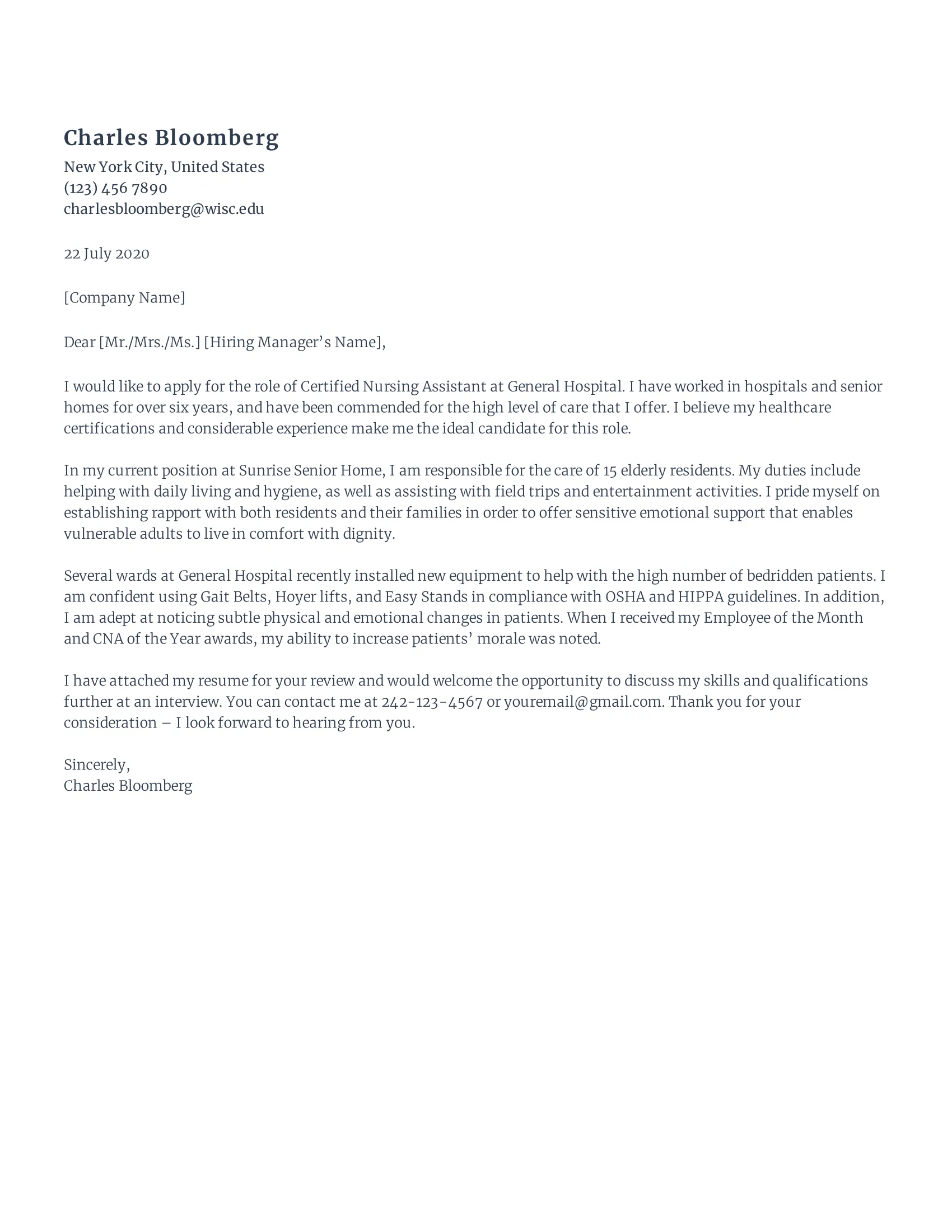
The closing of your cover letter is the last impression you make, so make it count. Thank the reader for their time and consideration. Reiterate your interest in the position and express your eagerness to discuss your qualifications further. Include a clear call to action by stating your availability for an interview and how they can contact you. A strong, concise, and professional closing leaves a lasting impression.
Thank You and Call to Action
End your cover letter by thanking the hiring manager for their time and considering your application. Make it clear that you are eager to discuss your qualifications further. Include a call to action by stating that you are available for an interview and provide the best way for them to reach you. Make sure to state your availability for an interview to take the next step toward employment.
Formatting and Proofreading Your Cover Letter
A well-formatted and error-free cover letter reflects professionalism and attention to detail. Poor formatting and errors can detract from your qualifications, so it’s essential to take the time to format your letter correctly and thoroughly proofread it. Make sure your cover letter is easy to read and free from grammatical errors, and your document looks great.
Formatting Guidelines
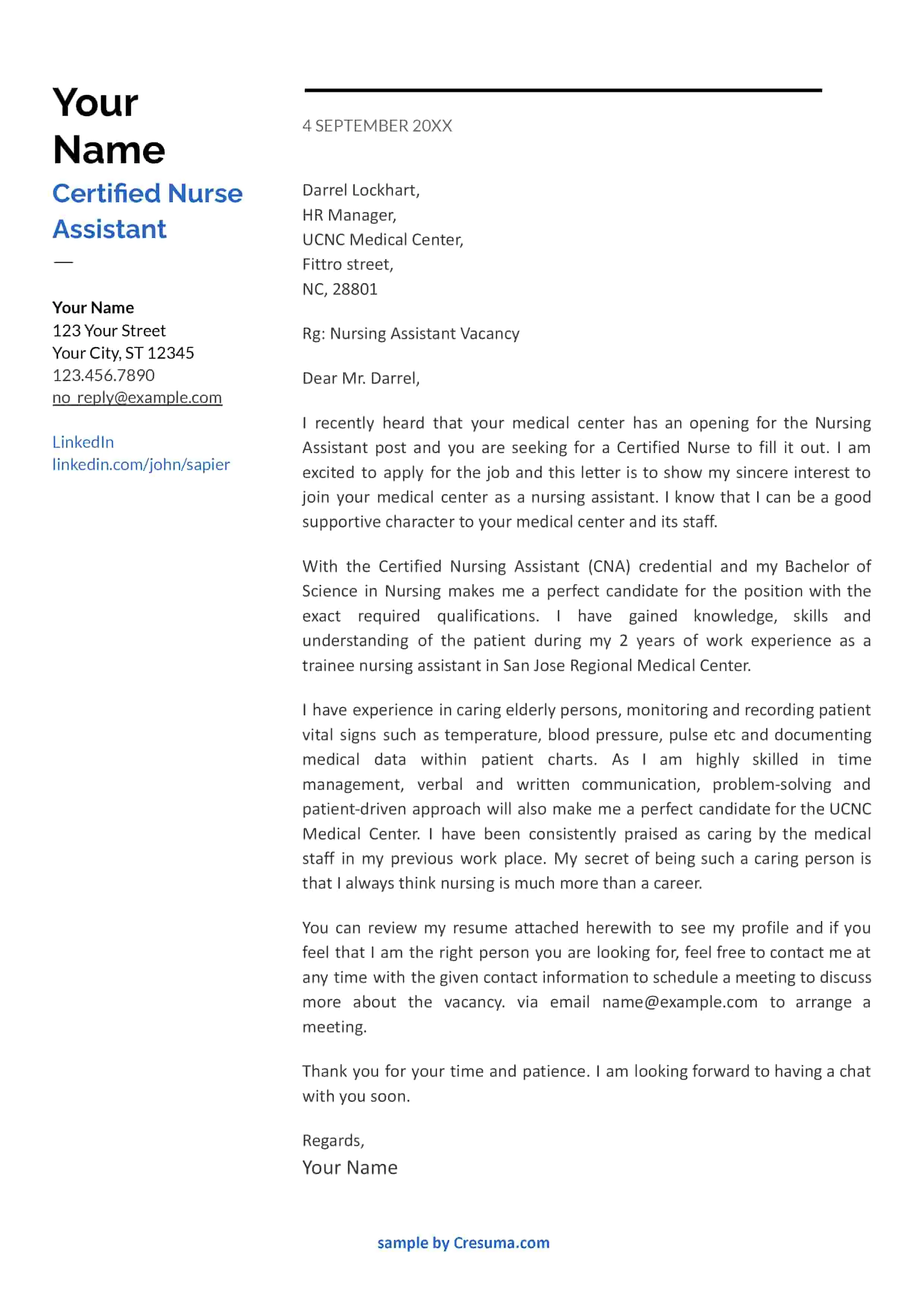
Use a professional and easy-to-read font, such as Times New Roman, Arial, or Calibri. Maintain a consistent font size between 10 and 12 points. Use standard margins (1 inch on all sides) and single-space your text. Use clear paragraph breaks to separate ideas and make the letter easy to scan. The layout should be clean and professional. Be sure to use a professional style of writing.
Proofreading Tips
Proofread your cover letter multiple times to catch any errors. Check for spelling, grammar, punctuation, and formatting mistakes. Read your cover letter aloud to catch awkward phrasing. Have a friend or family member review your letter as a second set of eyes can often identify mistakes you might miss. Ensure that your letter is polished and professional before you submit your application. Before sending, make sure your formatting is correct and looks great.
Reviewing Cover Letter Examples
Reviewing samples of nursing assistant cover letters is a good way to understand how to structure and write your own. Look for examples that align with your experience and career goals. Pay attention to how the writers highlight their skills and experience, and try to adapt similar techniques to your own cover letter. Keep in mind that these examples are templates. Take these examples and modify them to fit you. You don’t want to copy someone else’s work.
Analyzing Effective Samples
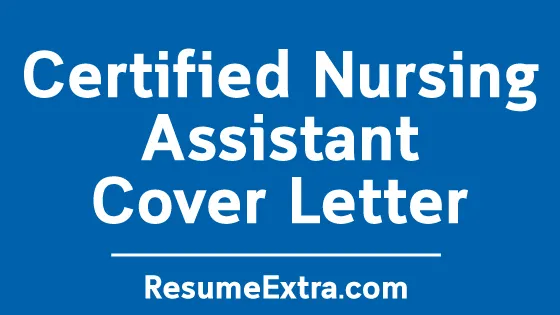
When reviewing cover letter samples, focus on the following elements. How is the letter structured? Is the tone professional and engaging? How are the applicant’s skills and experience presented? Do the examples show the use of quantifiable achievements? How well does the letter demonstrate passion for patient care? Take notes on the elements you want to include in your own letter. Remember to tailor the examples to your specific qualifications.
Common Mistakes to Avoid
Avoiding common mistakes is critical to ensure your cover letter effectively represents you. Make sure you avoid these common mistakes when drafting your cover letter.
Incorrect Formatting
Poor formatting can make your cover letter appear unprofessional. Avoid using unusual fonts, inconsistent spacing, and poor alignment. Keep your letter clear and easy to read. Ensure the document is properly formatted, easy to read, and looks great.
Generic Language
Avoid using generic language that could apply to any job. Instead, tailor your cover letter to the specific role. Use specific examples, quantifiable achievements, and showcase the skills and experience that are most relevant to the position. Generic statements make your application sound like everyone else’s. Tailor your application and be specific.
Lack of Specificity
A cover letter needs to be specific. Avoid general statements. Instead of saying you’re a “hard worker”, provide examples. For instance, you can mention that you “successfully managed a full patient load while assisting with multiple treatments.” Show how your hard work benefits the patients. Give specific instances where your actions made a difference. Specificity adds weight to your claims and demonstrates your value.
Tailoring Your Cover Letter
Tailoring your cover letter to each job application significantly increases your chances of success. A tailored cover letter shows that you have taken the time to understand the role and the requirements. Customize your cover letter for each application to make sure it stands out.
Researching the Facility
Before writing your cover letter, research the healthcare facility. Understand the facility’s mission, values, and the specific needs of their patients. This research will help you tailor your cover letter to the facility and highlight how your skills and experience align with their values. Mention specific aspects of the facility’s mission or values to show genuine interest and demonstrate that you are a good fit.
Customizing for Each Application
Adapt your cover letter for each application to reflect the specific requirements and expectations of the job posting. Use keywords from the job description. Focus on the skills and experiences that are most relevant to the position. Customize the letter to reflect the facility’s specific needs. Customize the cover letter to each specific job to maximize your chances of landing an interview.
Using Action Verbs to Enhance Your Letter
Use action verbs to make your cover letter more dynamic and engaging. Start each bullet point or sentence describing your accomplishments with a strong action verb. Instead of saying “responsible for,” try “managed,” “coordinated,” or “implemented.” Action verbs make your cover letter more compelling and show what you have done. Make sure you use action verbs when drafting your cover letter to give it an extra punch.
